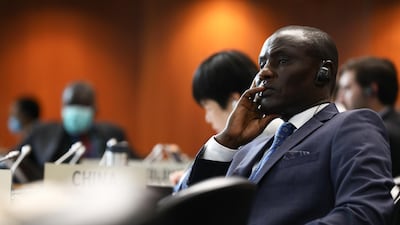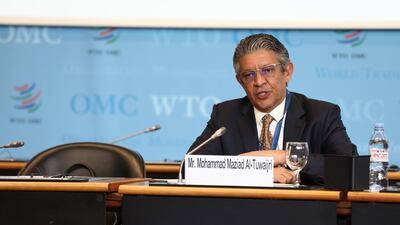Saudi Arabia’s candidate for the top job at the World Trade Organisation stands out from the other contenders through his more managerial approach to the role.
Mohammad Al Tuwaijri, the former minister of economy and planning and a former air force pilot, believes that there are lessons to be learnt from Saudi Vision 2030.
The framework, which he helped produce in 2016, intends to reduce the kingdom’s economic dependence on oil and develop public service sectors in fields such as health care, education, infrastructure, recreation and tourism by 2030.
“This is the fifth year and I am proud to see this transformation taking place in a very difficult region. The core concepts are economic diversification, empowering the private sector [and having more] women in power,” he said.
Mr Al Tuwaijri sees the management and leadership aspects of the WTO as similar in nature to the kingdom’s transformation.
He is one of eight candidates who appeared before the WTO’s General Council – the decision-making body composed of envoys from the 164 member countries – to pitch their suitability for director general this week.
This year’s shortlist also includes three women and three African candidates, as well as a Brexiteer.
The other candidates are Nigerian's former foreign and finance minister Ngozi Okonjo-Iweala; Egyptian former diplomat Hamid Mamdouh; and Kenya's former WTO general council chairwoman Amina Mohamed. South Korean Trade Minister Yoo Myung-hee is also in the running.
From Europe, Britain’s first post-Brexit international trade secretary, Liam Fox and former Moldovan foreign minister Tudor Ulianovschi are pitching for the role at the multilateral body.
A decision on the candidates will be made by the general council by August 31, when the incumbent, Roberto Azevedo of Brazil, steps down.
Formidable challenges
The new WTO leadership faces challenges such as growing trade tensions, greater protectionism and trade uncertainty concerning the coronavirus pandemic.
US President Donald Trump has been critical of the WTO since taking office, arguing it has been too soft on China.
Adding to this, the WTO’s Appellate Body, the court which provides the final decision in any trade dispute, has not been active since December 2019 and lacks an adequate number of judges to produce rulings and take on new cases.
An interim appeal court has been set up by some WTO members, including the EU and China, but India and the US have not joined.
Mr Al Tuwaijri acknowledges the challenges of bringing the US back on board and, more strongly, defining China’s trade relationship with the world. Under its G20 presidency this year, Saudi Arabia has been working on developments into WTO reforms.
“It's very important that we resolve the brand issue, the reputation issue, the process issue, but also we have the political will behind the reforms – it's a must,” Mr Al Tuwaijri said.
He said that many of the problems of the WTO were related to management and leadership but acknowledged that there were also political problems.
“Why would countries go into disputes? Because the negotiation process did not work. So how do we improve the negotiation process? This is a management problem; it is a leadership problem.”
Mr Al Tuwaijri intends to understand the causes of the organisation straying from its mission and what can be done to address them.
He wants all the members to be collectively aware of the root causes and to have “key performance indicators to make sure the organisation doesn’t drift again”.
Many believe that it is now Africa’s turn to lead the global referee of international trade, given that no one from the continent has held the post.
Egyptian commercial law academic Abdel-Hamid Mamdouh has a somewhat different background to the other seven contenders for the role.
He said the main challenge facing the body was a “fading sense of common purpose” and he vowed to “immediately revive the negotiating function of the organisation”.
Mr Mamdouh also urged Beijing and Washington to seek to resolve their trade disputes within the WTO.








